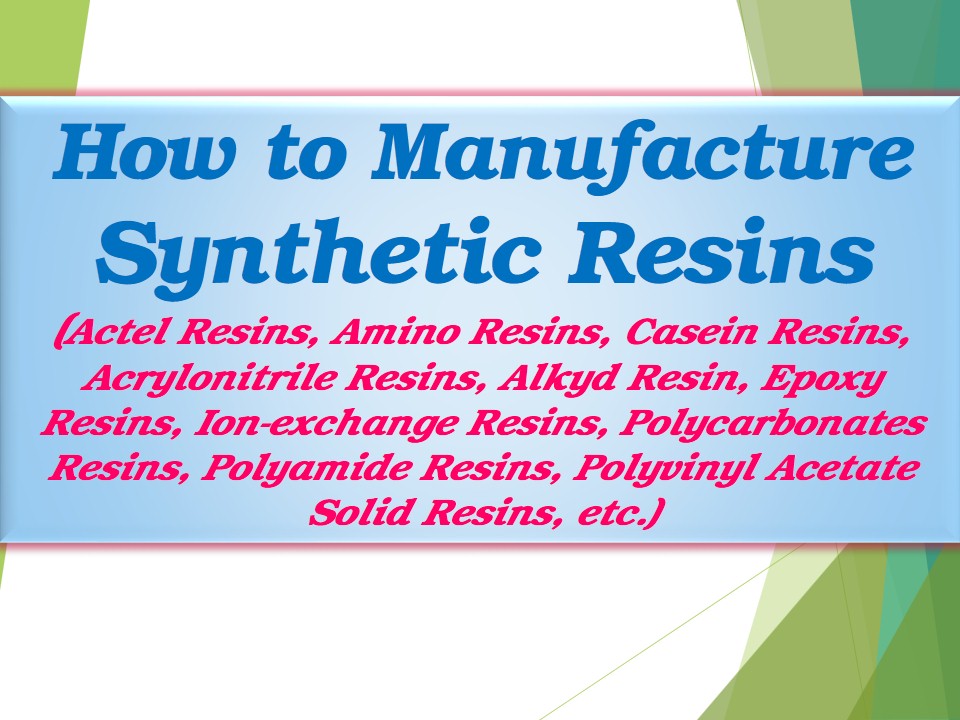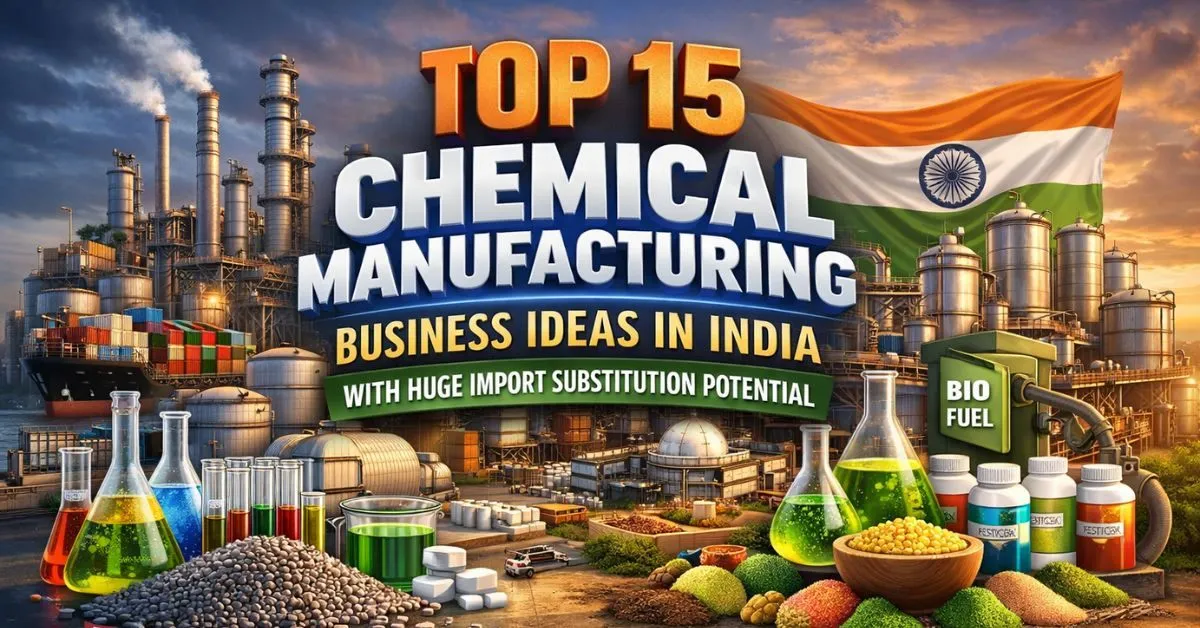
Synthetic resins have been widely used across various industries due to their excellent bonding strength, flexibility, durability, and chemical resistance. These resins are primarily manufactured through controlled chemical reactions involving polymers, monomers, and additives. As demand for synthetic resins continues to rise in sectors such as adhesives, paints, coatings, plastics, and textiles, the need for efficient manufacturing practices has been strongly emphasized.
Moreover, synthetic resins have played a significant role in replacing natural resins, especially where performance and uniformity are critical. Consequently, investors and manufacturers have shown increased interest in setting up production units to meet market requirements.
Contents
Types of Synthetic Resins
Before the manufacturing process is explained, an understanding of the major types of synthetic resins must be developed. These are usually classified based on their chemical properties and end-use applications.
See Also – Rare Earth Metals Extraction
Thermoplastic Resins
Thermoplastic resins can be melted and reshaped multiple times. Common examples include polyethylene (PE), polypropylene (PP), polyvinyl chloride (PVC), and polystyrene (PS). These resins have been used extensively in packaging, containers, piping, and automotive components.
Thermosetting Resins
Unlike thermoplastics, thermosetting resins cannot be reshaped once cured. Examples include epoxy resins, phenolic resins, urea-formaldehyde (UF), and melamine-formaldehyde (MF). These are widely preferred in adhesives, circuit boards, laminates, and insulation materials.
Raw Materials and Formulation
Synthetic resins are generally produced using chemical substances such as formaldehyde, phenol, melamine, epoxides, anhydrides, and polyols. In most cases, specific catalysts, initiators, and stabilizers are added to promote polymerization and enhance the resin’s functional characteristics.
Initially, raw materials must be procured and stored under controlled conditions. Stringent quality checks are applied before formulation begins. Depending on the type of resin being manufactured, different ratios and chemical compositions are followed, as defined by industrial formulation standards.
Manufacturing Process of Synthetic Resins
1. Polymerization Reaction
To begin with, a polymerization process is initiated. Monomers are combined with catalysts in reaction vessels under specific temperature and pressure conditions. Through free radical, condensation, or addition polymerization, the desired polymer chains are created. For instance, in phenol-formaldehyde resin production, phenol and formaldehyde are reacted in the presence of a base or acid catalyst.
Furthermore, continuous agitation is applied during the reaction to ensure uniform mixing. The polymerization time is carefully monitored and controlled to avoid overreaction or premature curing.
2. Curing and Crosslinking
In the next stage, curing agents are introduced to initiate crosslinking. This step is crucial in thermosetting resin production, as it imparts rigidity and thermal stability. Heat or ultraviolet light is usually applied to complete the curing process. In some cases, the reaction mixture is transferred to molds where final shapes are obtained.
As the reaction progresses, viscosity rises, indicating successful chain growth. Therefore, close attention must be paid to temperature and time controls to avoid incomplete reactions.
3. Cooling and Degassing
Once curing is complete, the resin mass is allowed to cool. During this time, any volatile substances, gases, or entrapped air are removed using vacuum degassing techniques. Degassing ensures that the final product remains free from bubbles and has optimal clarity and strength.
Subsequently, the cooled resin is transferred to storage containers or directly to shaping molds.
4. Additives and Stabilization
To enhance the resin’s functionality, various additives may be incorporated. These include UV stabilizers, antioxidants, flame retardants, fillers, and plasticizers. Through precise dosing and homogeneous mixing, the physical and chemical performance of the resin is further refined.
In many facilities, computerized batching systems are installed to automate additive incorporation and maintain batch-to-batch consistency.
5. Filtration and Packaging
The final resin mixture is filtered to remove any solid impurities. Filtration ensures that uniform texture and purity are achieved. The filtered resin is then packaged in drums, barrels, or IBC tanks depending on the client’s requirements.
If solid resins are being produced, the material is converted into flakes, granules, or powder form before being packed. Safety labels, handling instructions, and expiry dates are affixed to all packages prior to shipment.
Equipment Used in Resin Manufacturing
Modern synthetic resin plants are equipped with specialized equipment for efficient operation. Key machinery includes:
-
Reaction vessels (with temperature and pressure controls)
-
Mixers and agitators
-
Cooling systems
-
Vacuum degassing units
-
Filters and sieves
-
Automated dosing and packaging machines
These systems are usually made of stainless steel to prevent corrosion and chemical degradation.
Quality Control and Safety Standards
Throughout the manufacturing process, quality control tests are carried out. Parameters such as viscosity, pH, solid content, color, and reactivity are checked to ensure conformity to specifications. Additionally, sample batches are cured and tested for performance characteristics such as adhesion, durability, and thermal resistance.
Stringent safety protocols are also enforced in resin plants. Proper ventilation, chemical handling procedures, and fire safety measures are implemented. Personnel are trained regularly in material safety data sheet (MSDS) compliance and emergency response.
Environmental Considerations
Since synthetic resins involve petrochemical-based inputs and potentially hazardous emissions, environmental measures are taken seriously. Wastewater from the process is treated before disposal. Air emissions are filtered through scrubbers or condensers to prevent volatile organic compounds (VOCs) from entering the atmosphere.
Moreover, newer technologies have been adopted to reduce energy consumption and carbon footprint. Solvent-free resin formulations and waterborne systems are being promoted as eco-friendly alternatives.
Market Applications of Synthetic Resins
Synthetic resins have become indispensable in several industrial applications. Some of the major sectors where these resins are used include:
-
Paints and coatings (Acrylics, alkyd resins)
-
Adhesives and sealants (Epoxy, polyurethane)
-
Textile and leather finishing (Urea-formaldehyde)
-
Construction and civil engineering (Polyester and vinyl resins)
-
Electrical and electronics (Insulating resins and encapsulants)
-
Automotive and aerospace (High-performance thermosets)
Because of their diverse usage, synthetic resins are manufactured on a large scale globally. Countries such as China, India, the USA, Germany, and Japan are major producers and exporters.
Investment and Profit Potential
Setting up a synthetic resin manufacturing unit requires investment in land, infrastructure, machinery, utilities, raw materials, and skilled labor. Typically, the setup cost ranges from ?1 crore to ?10 crores, depending on the plant size and type of resin produced.
Though initial investment is high, the business can be highly profitable due to the recurring demand from core industries. Margins can vary between 20% to 35% depending on the product quality, customization, and marketing strategies.
Additionally, government support for chemical industries and the push for Make in India initiatives can further enhance profitability and ease of business.
See Also – Food & RTE Retort Packing
Conclusion
In conclusion, synthetic resin manufacturing has been recognized as a lucrative and sustainable business opportunity. Due to its wide range of applications, strong market demand, and scalability, this sector has shown consistent growth globally. Although substantial investment and technical expertise are required, the long-term benefits and profitability make it a viable venture.
By following best practices in formulation, process control, quality testing, and environmental compliance, high-performance synthetic resins can be successfully manufactured. With careful planning, skilled personnel, and adherence to safety and regulatory norms, entrepreneurs and investors can build a rewarding business in the synthetic resin industry.














